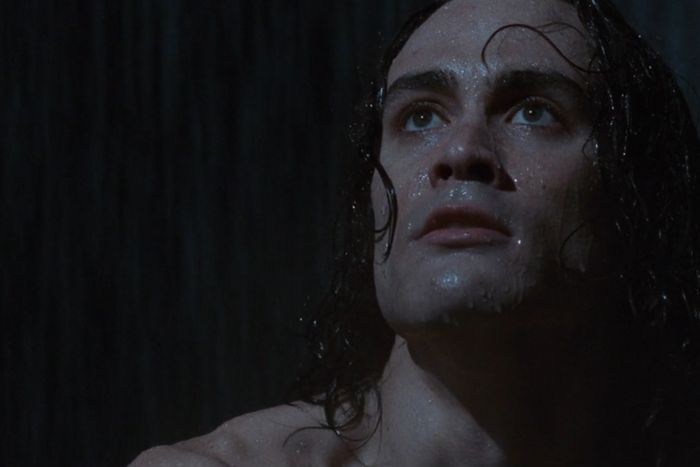
Every Wednesday in August, Vulture will choose a film to watch with readers as part of our Vulture Movie Club. This week’s selection comes from Vulture critic Roxana Hadadi, who will begin her screening of The Crow on Wednesday, August 14, at 7 p.m. ET. Head to Vulture’s Twitter to catch the live commentary.
That face. That beautifully sculpted, exquisitely controlled face, so capable of warmth and affection and menace and fury.
Brandon Lee knew exactly what to do with his profile, his reactions, and his gaze in The Crow, the 1994 adaptation of James O’Barr’s cult-classic graphic novel — the film seethes with the nuance and energy of Lee’s dual performance. It’s impossible to talk about The Crow without acknowledging Lee’s accidental death during its production, and the eerie coincidence of Lee being fatally shot during the scene when his own character is killed. That tragedy will always hang over the film like a shroud, fueling conspiracy theories about the similarly early deaths of Lee and his father, martial arts icon Bruce Lee. But to focus only on that calamity is to ignore that Lee is marvelously, exhilaratingly alive in The Crow, an actor so totally disinterested in artifice that he gives the movie’s supernatural circumstances an intoxicatingly human pull.
As charismatic rock star Eric Draven, Lee is a smiling, warm figure, a man easy with affection and a fascinated by the morbid and macabre. (The logo for his band, Hangman’s Joke, is a skeleton smiling as it adjusts the noose on its own neck.) When Draven and his fiancée, Shelly (Sofia Shinas), are assassinated by crime lord Top Dollar (Michael Wincott, deliciously bad) and his favorite thugs, the crime is indicative of the apathy spreading throughout Detroit. Here was a nice young couple about to get married, involved in their community and opposed to tenant eviction in their neighborhood, and their slaughter remains unsolved — until a year later, when Draven is brought back from the dead by a mysteriously powerful crow and sets out to murder everyone responsible.
It would have been easy for Lee to play Draven as just a punishing force, to foreground only how hardened he is by the awful things that happened to him and Shelly. And to be fair, the film’s action scenes are visceral: A darkly mischievous Lee uses his martial-arts-trained fluidity as he takes hits, whirls and twirls around a massive shootout sequence, and waves good-bye to one of the baddies he sends to his death off a pier. But as great as those sequences are (and they are still some of the bloodiest and gnarliest scenes to ever appear in a comic-book movie), they wouldn’t have nearly the same impact if Lee hadn’t also leaned into Draven’s vulnerabilities. His yell of agony and longing when he realizes why he’s been brought back; how his face crumples into despair when he finds Shelly’s wedding-gown catalogue and her earrings gathering dust in her vanity; the little smile he gives disgraced detective Daryl Albrecht (Ernie Hudson) when he remembers an argument with Shelly and says, “Believe me, nothing is trivial”; the softness in his voice when he comforts Sarah (Rochelle Davis), the street kid Shelly used to take care of, and tells her, “It can’t rain all the time.” The poignancy of Lee’s performance is in how measured it is, how simultaneously gentle and irate. And it’s a sign of how much the actor had to give that some of the film’s best moments are, because of him, its quietest.
A lot of The Crow is baroque and brooding: It’s a lost-love story decorated with gigantic headstones and snarling gargoyle sculptures, soundtracked by genre icons like the Cure and Nine Inch Nails, and complemented by a lot of black lipstick and leather. Neither director Alex Proyas nor screenwriters David J. Schow and John Shirley skimp on the visual or narrative accoutrements needed to make this film feel alternately melancholy and wrathful. Red-hued, strobe-lit flashbacks show Eric and Shelly in happier days and in the agonizing final moments of their lives. First-person-perspective shots put us in Eric’s shoes after he’s brought back to life, from when he breaks through his coffin and crawls to the surface of his grave to his hand reaching for the crime-scene tape that still decorates his and Shelly’s front door. Every time Eric makes a crow symbol out of the blood of his victims, it’s a fist-pumping good time. Hell, there’s a sword fight in the pouring rain on a church rooftop, and yes, the action-figure box set of that scene is part of my merch collection. All of this is goth excellence. But the textured humanity Lee gives The Crow is still its strongest asset and, 30 years after the film’s debut, still its most memorable quality. My apologies to the many franchise sequels and the upcoming reboot, but without Lee, The Crow doesn’t fly.
More From This Series
- No Movie Captures the Essence of Neil Young’s Best Songs Like Inherent Vice
- The Action-Goth Masterpiece That Never Got Its Due
- Signs Is the M. Night Shyamalan Experience at Its Best


